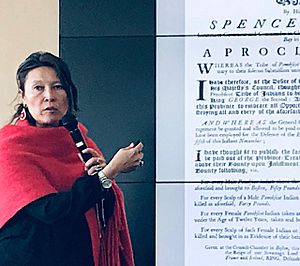Rebecca Sockbeson facts for kids
Quick facts for kids
Rebecca Sockbeson
|
|
|---|---|
 |
|
| Born | 1972 (age 53–54) |
| Nationality | Panawahpskek, American |
| Education | University of Maine (BA), Harvard University (Ed), University of Alberta (PhD) |
| Subject | Indigenous peoples' rights, Education policy |
Rebecca Sockbeson is a Wabanaki scholar and activist. She works to improve education for Indigenous Peoples. She is a member of the Penobscot Indian Nation. This nation is part of the Wabanaki Confederacy, located in Maine, USA, and parts of Canada.
Rebecca Sockbeson is an auntie to many Waponahki and Stoney Sioux young people. She is also a mother of three children. She is a professor at the University of Alberta. There, she teaches about Indigenous knowledge and how it can be shared. She also focuses on healing through language and culture, and fighting against racism. In 2018, her poem, “Hear me in this concrete beating on my drum”, won an award. It is now part of a permanent public art display in downtown Edmonton.
Contents
Rebecca Sockbeson's Education
Rebecca Sockbeson has studied at several universities. She earned her first degree from the University of Maine. Then, she received a master's degree in education from Harvard University. She later earned her PhD from the University of Alberta. Her PhD focused on education for Indigenous Peoples.
Her special study was called Cipenuk Red Hope: Weaving Policy Toward Decolonization & Beyond. In this study, she explored how Indigenous ways of knowing can help create new policies.
Professional Work and Research
In 1997, Rebecca Sockbeson started working at the University of Southern Maine. She helped coordinate programs for different cultures and supported Native American students.
In 2017, she and Cora Weber-Pillwax received a grant for a research project. This project looked at how Indigenous knowledge can be shared. It focused on working with Indigenous communities and universities.
Rebecca Sockbeson's speech at a university event was featured in a 2017 film. The film was called Journey Towards Reconciliation.
From 2018 to 2020, she helped the University of Maine College of Education. She worked to ensure future teachers learned about Maine's Wabanaki Studies Law. This law is also known as LD 291.
Sockbeson also worked as a historical consultant for a film. The film was about the Spencer Phips Proclamation.
Awards and Recognition
In 2013, Rebecca Sockbeson and her Indigenous colleagues won an award. They received the University of Alberta Human Rights Teaching Award. They earned this award for helping to create and teach a required course. This course was Alberta's first compulsory class on Aboriginal Education.
Activism and Policy Efforts
When she was young, Rebecca Sockbeson was inspired by stories of the American Indian Movement. She started a group called IRATE. This group stood for Indigenous Resistance Against Tribal Extinction.
Protecting the Environment
In 1999, Sockbeson spoke out against pollution in her community. She talked to international leaders about harmful chemicals called dioxins. She warned that if these pollutants were not stopped, the Penobscot people might not be able to live on their islands. She also spoke about environmental issues in the film Drumbeat for Mother Earth.
Fighting for Fair Names
In 2000, Rebecca Sockbeson and other Waponahki people spoke to the Maine Legislature. They supported a law called LD 2418, "An Act Concerning Offensive Names." She shared her own experiences of being hurt by offensive names. She explained why certain words are harmful to Indigenous peoples.
Advancing Indigenous Education Laws
Sockbeson was one of many Waponahki people who worked for a new law. This law was Maine Law LD 291: An Act to Require Teaching of Maine Native American History. The law passed in 2001 and started in 2004. She served on the Wabanaki Studies Commission from 2001 to 2003. Her role was to make sure the Wabanaki Studies Law was followed. She also helped create learning materials for the law.
Promoting Treaty Rights and Justice
In 2014, Sockbeson led a discussion at the University of Alberta. It was about Treaty rights and Indigenous education. In 2016, she joined other tribal members to pray for the water protectors at Standing Rock. These protectors were challenging the DAPL pipeline.
In 2018, Sockbeson led another discussion. It focused on educating for the justice of Indigenous people. She also brought attention to the verdicts in the deaths of Colten Boushie and Tina Fontaine.
In an interview with the Edmonton Journal in 2018, Sockbeson talked about Indigenous students' school performance. She said that racism is a main reason why Indigenous students leave school early. She explained that the term "achievement gap" often blames students. Instead, she said, it is often a "teacher development gap."
In 2020, the CBC interviewed Sockbeson. This was about a controversial hiring decision in Alberta. She stated that governments and schools have a duty to teach Canadian children about First Nations history. She said that hiring someone who doubts the experiences of residential school survivors is careless. She believes that teaching children the truth about Canada's history early on helps ensure past mistakes are not repeated.
 | John T. Biggers |
 | Thomas Blackshear |
 | Mark Bradford |
 | Beverly Buchanan |

